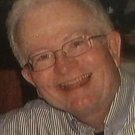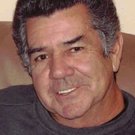Stephen D. Browne
KNOX — Stephen Browne was a big man with a long reach — both in his work as a wildlife biologist and in his community as a father figure. He had thick hands that he used for heavy work and for gentle comforting. And, he had a deep, resonant voice, which he used to speak out for his beliefs.
He died on Tuesday, July 24, 2012, in a tractor accident on his Pleasant Valley Road farm. He was 74.
This week, family and friends from nearby and around the world — including Mexico, Australia, India, Afghanistan, and Ireland — have been gathering at the Brownes’ farm to honor him and celebrate his life.
“He touched people from all over,” said his daughter, Heidi Browne Ricks. “Some of them, especially young men, needed a father figure…He led by example. He loved teaching, showing skills, having kids learn by doing. It’s not like sitting down with a book; it’s learning by splitting wood, bailing hay, digging a pond — he included everyone in what he was doing.”
Among those gathering from far and wide are those that Wendy DesAutels called the Brownes’ “extra kids.” Mr. Browne married Mary Breeze in October of 1963, and was the father of four children — Heidi, Erik, Adam, and Bart; grandfather of six; and a father figure and mentor to dozens of additional young people who were always welcome at the Brownes’ home. They called him “Poppa Browne.”
“I was one of the extra kids,” said Ms. DesAutels, an only child who grew up in Berne and now lives in Michigan. “For some, like me, it meant a great place to play with other kids; others actually lived there and needed to live there…Now, some of the extra kids have their own children and they visit the farm as well.”
She went on, “The property has 500 acres of streams and forests and caves and barns full of animals. Any time you walked with Poppa Browne, he would show you the secrets of the streams and forests.”
She vividly remembered the full-moon walks, where, shrouded in the quiet of night, the hikers would listen and observe. “One time, they pulled me out of bed — I was 6 or 7 — and we went to the top of the hill and looked at the northern lights. I’ll never forget that.”
Aaron Gagne, who also spent time as a kid on the Brownes’ farm, describes Mr. Browne as “wise, giving, caring — a mentor and a teacher.” Mr. Gagne’s best friend was Adam Browne. “I spent a tremendous amount of time with his family at the farm,” Mr. Gagne said. “Every day was an education. I was a suburban kid being taught everything from how to drive a tractor to how to hunt to how to sit peacefully in the woods and listen.”
Mr. Gagne works now as the community development director for the city of Aurora, Colo., site of the recent theater massacre. He said this week that it will be “a long road” to healing in Aurora but some of what he learned from Stephen Browne on the farm in the Helderbergs will help — “patience and how to listen to people,” said Mr. Gagne.
Regina Fitzsimmons came from Mexico when she was 15 to study at The Doane Stuart School where she met the Brownes’ children. The farm became a second home to her. “It was great,” she recalled. “Their house was always full of kids and adults from all over. They were very welcoming people.”
She recalled of Mr. Browne, “He used to make us breakfast every morning…He was a very hardworking man, but a lot of fun.”
Ms. Fitzsimmons recalled hanging out with some teens who were “into punk,” and, since Mr. Browne had a shaved head, she asked if he would shave hers. She recalled with a belly laugh, “He shaved half my head, and then took a Sharpie to cover the bald spots.”
She concluded of Mr. Browne, “He was very tough on the outside — he wouldn’t have died of a disease; he wouldn’t have laid down on a bed to die. But, on the inside, he had a big heart; he was such a nice, loving guy.”
Mr. Browne was a devoted father to all of his children, Ms. DesAutels said. The Brownes’ son, Erik, was born with disabilities. Mrs. Browne wanted a pool for Erik to swim in, Ms. DesAutels recalled. “Poppa Browne built that huge, gorgeous pond for him; that was a centerpiece for the farm. We all learned to swim there, and we’d skate there in the winter.” She concluded of Mr. Browne, “He was so tender, so thoughtful and loving, so compassionate….”
Mr. Browne sculpted other parts of his land for his children, too. “My dad built a waterfall for my wedding,” said his daughter, who was married on the farm. “He really loved working with nature to create beauty…He could see the big, big picture. He planted trees when I was tiny; he could see what it would look like today….We’ve been having maple syrup from some of those trees for years.”
Mr. Browne’s work on the farm shaped the big picture of his daughter’s life, too. “I learned to be a midwife by being with him on the farm,” she said. During lambing season, she said, “I learned how to watch and be quiet and when to step in and take action.”
She concluded, “For a great big bear of a man, he was a gentle soul. …I loved to see him hold baby things — baby chicks, baby lambs, baby anything. He was so gentle and sweet. He was super, super strong but super, super gentle and sweet.”
“Scientist and diplomat”
Mr. Browne was born in Avon, N.Y. on March 21, 1938. His father was a plumber and his mother, a homemaker.
“He had the thickest hands I’ve ever seen,” said his daughter. “He loved comparing his hands to other people’s….His mom told him to slap the pavement to get them big and strong, and they were.”
Mr. Browne always loved being outdoors. “As a kid, he would run away from school to go fishing,” said his daughter. She added, “He wasn’t a dummy.”
Mr. Browne went to Cornell University, originally with the idea of becoming a veterinarian, “but he liked being out in the wilderness,” his daughter said. After graduating, he worked as a wildlife biologist in Alaska, Tennessee, and Saskatchewan before joining the New York State Department of Environmental Conservation where he worked for 32 years, specializing in game, waterfowl, and endangered wetlands.
Mr. Browne was the state waterfowl specialist. “I followed in his path,” said Bryan Swift, who currently works for the DEC as the head of game management. Mr. Browne and his staff set hunting regulations for 30 species of waterfowl in New York State and worked out agreements with other states and provinces through the Atlantic Flyway Council, as well as coordinating monitoring programs and sharing research and other information.
One of his daughter’s fondest childhood memories is getting up at 3 or 4 in the morning to go duck banding with her father, as part of his work. “We’d sit quietly and still,” she said, as a net was thrown over the geese; then their legs were banded so their migratory paths could be followed. “No other kid got to go duck-banding,” she said.
Mr. Swift described his predecessor as “a combination of scientist and diplomat.” Mr. Browne was instrumental in two initiatives that brought sweeping change.
When Mr. Browne started his job, there was just one hunting season across the state. “He got the state divided into zones, approved by the United States Fish and Wildlife Service,” said Mr. Swift. So now the season in, say, the Catskills is different than that in the Adirondacks, which benefits both hunters and birds.
Another change was controversial. “He was deeply involved in the transition from lead shot to steel pellets” for hunting waterfowl, said Mr. Swift. The traditional lead shot was poisoning ducks that would pick through the mud and use the shot for grit for their digestion. Steel pellets had been developed in the 1970s but were unpopular with hunters; they had to learn to shoot differently.
The road to passing the state ban made for a contentious journey. “The mortality factor wasn’t obvious,” said Mr. Swift, and many hunters were set in their ways, not wanting to learn new techniques.
“Steve had to lead the educational campaign to inform hunters and get them to switch. There was a lot of resistance,” recalled Mr. Swift. “He took it to the masses, and was very involved in building grassroots acceptance. Ultimately, in 1988, it was made mandatory. But it took a toll on him.” Three years later, the ban was adopted nationwide.
“He was a very intense man,” said Mr. Swift. “He had a strong passion for what he believed in.”
“He wasn’t afraid of much,” said his daughter. “He wasn’t afraid of bucking the system, even if it wasn’t popular.”
Mr. Browne was an avid reader and student of history. He traveled extensively throughout the United States and abroad, including several trips to Ireland. “Always, however,” Ms. DesAutels concluded a tribute, “he was happiest working at home in the fields, woods, caves, and cliffs of the family homestead, caring for animals on the farm and enhancing the natural beauty of the property by planting trees, building new perennial gardens, and creating spaces of supreme beauty and quiet reflection.”
A ceremony will be held today, Thursday, Aug. 2, at 11 a.m. at the Browne residence, 634 Pleasant Valley Road in Knox. All are welcome to attend and share stories and reminiscences. The sharing is expected to last well into the day so visitors are welcome to join in when they are able. Online messages for the family may be sent to www.simplechoicescremation.com. Memorial donations may be sent to the Nature Conservancy or Ducks Unlimited.


